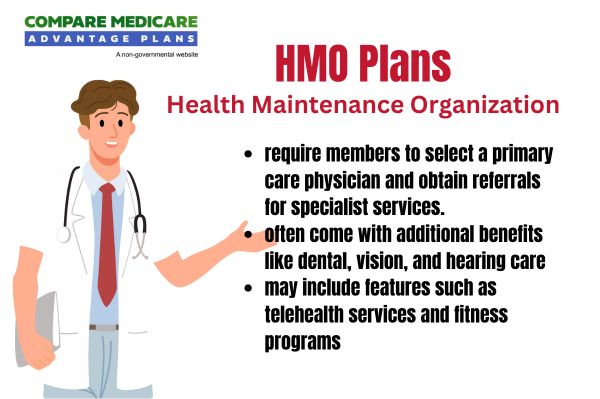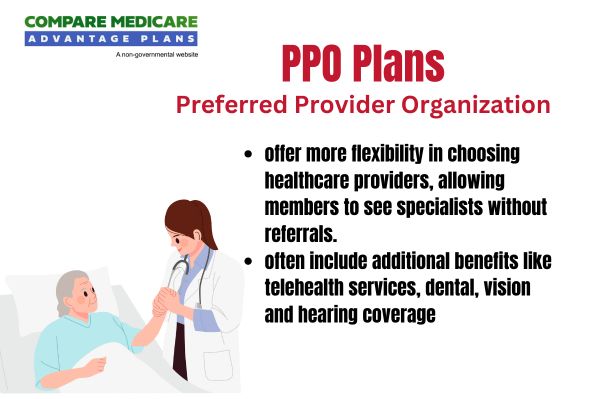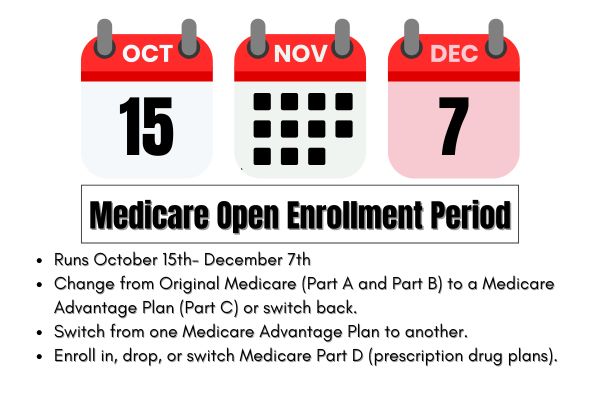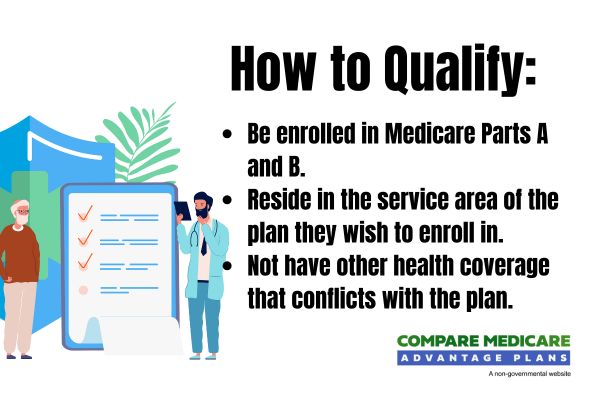




Medicare Advantage Plans Washington 2026
Curious about Medicare Advantage Plans Washington
Key Takeaways
- Washington Medicare Advantage plans combine hospital and outpatient services, offering supplemental benefits such as vision and dental care, making them a comprehensive healthcare solution for beneficiaries.
- The state offers various plan types including HMO, PPO, and Special Needs Plans, each catering to different healthcare preferences and needs, with differing levels of flexibility and costs.
- Key trends
for 2026 reveal an increase in out-of-pocket maximums and a decline in plan offerings, necessitating beneficiaries to stay informed about their coverage options and costs.
Compare Plans in One Step!
Enter Zip Code
Understanding Washington Medicare Advantage Plans 2026

Medicare Advantage plans in Washington provide an alternative to traditional Medicare, combining coverage for hospital and outpatient services into a single plan. These plans are known for offering supplemental benefits such as vision, dental, and hearing coverage, which are not typically part of Original Medicare. This makes them an attractive option for many Medicare recipients looking for comprehensive healthcare solutions.
Washington’s Medicare Advantage plans must cover all services included in Original Medicare, guaranteeing that basic healthcare needs are met. Beneficiaries can select from a variety of plans that align with their specific healthcare needs and budget.
The flexibility and comprehensive coverage make Medicare Advantage an attractive option for many in Washington, particularly as we near
Types of Washington Medicare Advantage Plans Available
Washington offers a variety of Medicare Advantage plans to cater to different healthcare needs. These include Health Maintenance Organization (HMO) plans, Preferred Provider Organization (PPO) plans, and Special Needs Plans (SNPs). Each type of plan has its unique features and benefits, allowing Medicare recipients to select the one that aligns best with their healthcare preferences and requirements.
HMO Plans

HMO plans are a popular option for Medicare recipients in Washington. These plans typically require members to choose a primary care physician (PCP) who becomes the central figure in managing their healthcare. The PCP is responsible for providing referrals to specialists, ensuring that all aspects of the patient’s health are coordinated efficiently.
A key advantage of HMO plans is their emphasis on preventive care and wellness programs. Requiring referrals helps HMO plans offer a more integrated approach to healthcare, potentially reducing unnecessary treatments and costs. Members must stay within the plan’s network of providers to avoid higher out-of-pocket expenses.
PPO Plans

PPO plans provide more flexibility than HMO plans. Members of PPO plans are not required to choose a primary care physician and can see any doctor or specialist without needing a referral. This flexibility makes PPO plans appealing for those who want greater freedom in choosing healthcare providers.
PPO plans allow visits to out-of-network providers, though this often involves higher costs. The ease of accessing specialist services without referrals and the freedom to choose healthcare providers make PPO plans a preferred choice for many Medicare recipients in Washington.
Special Needs Plans (SNPs)

SNPs cater to individuals with specific health conditions or situations. They offer specialized benefits and services tailored to meet unique member needs. For example, Chronic Condition SNPs focus on beneficiaries with serious chronic illnesses like diabetes or cancer, while Institutional SNPs are aimed at individuals residing in long-term care facilities.
SNPs include all standard Medicare Part A and Part B benefits, plus additional services like reduced cost-sharing and individualized care plans.
With over 2.4 million enrollees in nearly 600 SNPs across the U.S., these plans play a crucial role in providing targeted care and support for those with high medical needs.
Overview of Washington Medicare Advantage Plans 2026
Medicare Advantage has become increasingly popular among Medicare recipients, with more than half of the eligible Medicare population now choosing these plans. Enrollment in Medicare Advantage has grown significantly, with over 34 million beneficiaries enrolled in 2025. This trend highlights the widespread appeal of Medicare Advantage plans, particularly their ability to offer better care at lower costs compared to traditional Fee-For-Service Medicare.
Despite the rising popularity, there has also been an increase in the out-of-pocket maximums for beneficiaries, with the median out-of-pocket maximum rising significantly in 2025. Additionally, there has been a decrease in the number of individual Medicare Advantage plan offerings, marking the first decline observed in over ten years.
These trends underscore the dynamic nature of Medicare Advantage plans and the need to stay informed about changes and new options.
Covered Services and Benefits

Medicare Advantage plans generally cover essential services like hospitalization, outpatient care, and preventive services. Many Medicare Advantage plans also offer supplemental benefits such as vision, dental, and hearing care. This comprehensive coverage makes Medicare Advantage plans an attractive option for many beneficiaries.
Additionally, Medicare Advantage plans frequently include wellness programs, fitness memberships, and telehealth options. Prescription drug coverage is also a common feature, allowing beneficiaries to access necessary medications.
Some plans also cover home health care and personal care services, effectively addressing senior needs. With coverage for emergency services mandated in all plans, Medicare Advantage ensures vital support during urgent situations.
Key Benefits of Washington Medicare Advantage Plans 2026
One of the most significant benefits of Washington Medicare Advantage Plans is the inclusion of additional services like dental, vision, and hearing coverage, which are not typically part of Original Medicare. This comprehensive approach to healthcare ensures that beneficiaries have access to a wide range of services to maintain their overall well-being.
Moreover, many Washington Medicare Advantage Plans offer integrated drug coverage, simplifying medication management and reducing out-of-pocket costs for prescription drugs. These plans often provide coordinated care through a network of providers, enhancing the efficiency and quality of medical services received.
Additionally, the lower premiums compared to Original Medicare make these plans an affordable option for many beneficiaries. With wellness programs aimed at promoting preventive health, Medicare Advantage Plans help reduce the risk of chronic conditions.
Additional Health Services
The proposed rules
Medicare Advantage plans are also encouraged to adopt new guidelines for using artificial intelligence to ensure equitable access to health services. Supplemental benefits like anti-obesity medications are proposed to be covered if they are used for the treatment of obesity.
The changes aim to clarify how supplemental benefits can be administered, including the use of debit cards for purchasing approved health-related items. These enhancements aim to improve the overall healthcare experience for Medicare recipients in Washington.
Enrollment Process for Washington Medicare Advantage Plans 2026
Washington’s Medicare Advantage plans have several key periods for beneficiary enrollment. Knowing these periods is essential for timely enrollment and continuous coverage.
When to Enroll
Beneficiaries can first enroll in a Medicare Advantage plan when they become eligible for Medicare, usually at age 65. The Initial Enrollment Period lasts seven months, starting three months before and ending three months after the 65th birthday. This period is a critical window for new beneficiaries to begin their Medicare journey.

The annual Open Enrollment Period for Medicare Advantage Plans runs from October 15 to December 7, allowing beneficiaries to join, switch, or drop plans. Individuals enrolled in a Medicare Advantage Plan have until March 31 of the following year to make changes during the Medicare Advantage Open Enrollment Period.
Special Enrollment Periods are available for unique circumstances like moving or losing other coverage, allowing beneficiaries to adjust their plans as needed.
Different Enrollment Periods
Specific enrollment windows include the Initial Enrollment Period, Annual Enrollment Period, and Open Enrollment Period, each with distinct deadlines. The Initial Enrollment Period for new Medicare beneficiaries lasts from three months before to three months after the individual becomes eligible for Medicare.
During the Open Enrollment Period, which runs from October 15 to December 7, individuals can join, switch, or drop Medicare Advantage or drug plans. The Medicare Advantage Open Enrollment Period occurs from January 1 to March 31, allowing beneficiaries to change their plans or revert to Original Medicare.
Special Enrollment Periods are triggered by life events such as relocating or losing coverage, enabling beneficiaries to enroll in or switch plans.
OEP, AEP, Special Enrollment
The Open Enrollment Period (OEP) allows changes to Medicare Advantage plans from January 1 to March 31, while Special Enrollment Periods occur due to qualifying life events. The Annual Enrollment Period (AEP) allows beneficiaries to switch plans each year from October 15 to December 7.
Special Enrollment Periods (SEPs) are available in conditions such as moving out of a plan’s service area or joining a Special Needs Plan. During these periods, beneficiaries can make necessary changes to their coverage to ensure it meets their needs.
Knowing these enrollment windows is essential for maintaining continuous and appropriate coverage.
Costs Associated with Washington Medicare Advantage Plans 2026

Costs related to Washington Medicare Advantage plans include premiums, co-pays, and out-of-pocket expenses.
Understanding these costs is key to managing healthcare expenses effectively.
Premiums and Co-Pays
Premiums for Washington Medicare Advantage plans vary significantly based on the plan and its benefits, with some offering $0 premium options. Co-pays are typically required for certain services, with amounts varying by provider and service type, impacting overall healthcare costs.
Medicare Advantage plan payments are projected to increase by around 4.33%, amounting to over $21 billion from 2025 to
Out-of-Pocket Maximums
Medicare Advantage plans in Washington have specific out-of-pocket maximums, which limit the total amount a beneficiary pays for covered services in a year. The out-of-pocket maximum can differ by plan, affecting how much beneficiaries ultimately pay for their healthcare services.
The median out-of-pocket maximum for Medicare Advantage plans is expected to rise by 8%, from $5,000 in 2024 to $5,400 in 2025.
This increase underscores the importance of understanding plan-specific details to manage healthcare costs effectively.
Covered Services and Benefits
The proposed
New standards aim to limit cost-sharing for mental health and substance abuse services to align with costs in Traditional Medicare. CMS is introducing measures to ensure equitable access to behavioral health services in Medicare Advantage plans by capping out-of-pocket costs.
The use of debit cards for administering supplemental benefits is being scrutinized to ensure clarity and protect beneficiaries’ access to needed services.
How to Qualify for Washington Medicare Advantage Plans 2026

Individuals must be enrolled in both Medicare Part A and Part B to qualify for Washington Medicare Advantage Plans. They must also reside in the plan’s service area. This residency requirement ensures access to the plan’s network of providers.
Some plans may have additional requirements, such as age or specific medical conditions. For example, some Special Needs Plans are designed for individuals with chronic illnesses or those living in institutions.
Low-income individuals may qualify for assistance programs that help with plan enrollment and costs, making healthcare more accessible.
Contracted Network and Access to Care
Access to care in Medicare Advantage plans depends on a network of in-network providers. These networks are crucial as they significantly impact the availability and cost of services for beneficiaries. Medicare Advantage plans must maintain adequate networks to ensure timely access to care, including regular evaluations of network adequacy.
Beneficiaries should verify provider participation in their plan’s network, as out-of-network services can result in higher costs or denial of coverage. Plans must clearly communicate changes in network status and regularly update their directories to reflect current provider availability.
CMS emphasizes that Medicare Advantage plans should enhance transparency in their provider directories, making it easier for beneficiaries to find in-network providers.
Comparing Washington Medicare Advantage Plans to Original Medicare
Medicare Advantage plans usually require users to stay within a network of providers, while Original Medicare allows greater flexibility in choosing doctors and hospitals. This difference in provider flexibility is a key distinction between the two types of Medicare coverage.
Coverage Differences
Original Medicare covers a wide range of necessary services but does not include routine vision, dental care, or most preventive services. These additional benefits are often available through Medicare Advantage plans, making them a more comprehensive option for broader coverage. Medicare Advantage plans frequently include prescription drug coverage, which Original Medicare does not automatically include.
Supplemental benefits like wellness programs, fitness memberships, and telehealth options in Medicare Advantage plans further distinguish them from Original Medicare. These benefits contribute significantly to the overall well-being of beneficiaries, offering a more holistic approach to healthcare.
Cost Comparisons
Medicare Advantage plans often cap out-of-pocket expenses, providing more predictable costs compared to Original Medicare, which has no out-of-pocket limit. This cap is particularly beneficial for those who require frequent medical services, limiting their total annual expenses.
Medicare Advantage plans also tend to have lower premiums compared to Original Medicare, making them financially appealing for certain beneficiaries. Out-of-pocket expenses can vary significantly between Medicare Advantage plans and Original Medicare, with some Advantage plans offering lower maximum out-of-pocket limits.
Additionally, the inclusion of benefits like dental and vision care, which are not covered by Original Medicare, can lead to overall cost savings for beneficiaries.
Emergencies and Referrals

Medicare Advantage plans cover medical emergencies globally without any annual or lifetime limits. This ensures that beneficiaries can access emergency care wherever they are, without worrying about coverage limits. Members of HMO plans may need referrals for certain services, while PPO plans allow direct access to specialists without referrals.
Out-of-network providers are not obligated to treat members unless it’s an emergency situation. In emergencies, Medicare Advantage plans allow members to seek care from any provider, even those outside their network.
It’s essential for members to understand their plan’s emergency care policies to ensure coverage during urgent situations.
Summary
Understanding the intricacies of Washington Medicare Advantage Plans is crucial for making informed healthcare decisions
The enrollment process, costs associated with these plans, and the differences between Medicare Advantage and Original Medicare are all essential factors to consider. By staying informed and understanding the various aspects of Medicare Advantage Plans, beneficiaries can choose the best plan for their needs, ensuring access to quality healthcare and financial peace of mind.
Frequently Asked Questions
→ What are the key benefits of Washington Medicare Advantage Plans?
Washington Medicare Advantage Plans provide essential benefits such as dental, vision, and hearing coverage, integrated drug coverage, and wellness programs, ensuring coordinated care and lower premiums for enrollees. These features enhance overall healthcare access and affordability for beneficiaries.
→ When can I enroll in a Medicare Advantage plan?
You can enroll in a Medicare Advantage plan during your Initial Enrollment Period around your 65th birthday, the Annual Enrollment Period from October 15 to December 7, or during Special Enrollment Periods due to qualifying events. It is important to choose your enrollment period wisely to ensure coverage.
→ What are the costs associated with Medicare Advantage plans in Washington?
Medicare Advantage plans in Washington involve costs such as premiums, co-pays, and out-of-pocket expenses, with some plans offering $0 premiums. Additionally, it is important to note that out-of-pocket maximums are set to increase
→ How do Medicare Advantage plans differ from Original Medicare?
Medicare Advantage plans differ from Original Medicare by offering additional benefits such as dental and vision care, imposing a cap on out-of-pocket expenses, and requiring the use of a specific provider network, while Original Medicare provides greater flexibility in choosing healthcare providers.
→ What should I do in case of a medical emergency under a Medicare Advantage plan?
In a medical emergency under a Medicare Advantage plan, you can seek care from any provider, including those outside your network, as these plans cover emergencies globally without annual or lifetime limits. It is crucial to act promptly and prioritize your health by accessing the nearest appropriate medical facility.

ZRN Health & Financial Services, LLC, a Texas limited liability company



